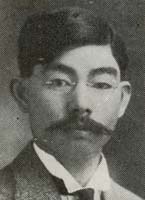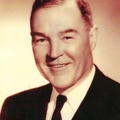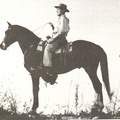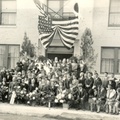Read Part 4 >>
With the attack on Pearl Harbor, the attention of the entire nation was focused on the Japanese. Wright’s energies were directed almost exclusively toward the problems, which the Japanese in California faced as a result of the conflict.
Most Americans and all Japanese in the United States and abroad know the sad story of the Japanese internment during World War II. By 1941 there were many Nisei, people of Japanese ancestry, who were citizens of the United States by birth. These young people were enterprising and diligent. They took advantage of educational opportunities and became professionals in many fields. They were intensely loyal to the United States and admired its form of government.
In spite of this, soon after the attack on Pearl Harbor, by Presidential Executive Order 9066, signed by Franklin D. Roosevelt, February 19, 1942, American citizens of Japanese descent and aliens alike were placed in internment camps. There was fear that in a war they might cooperate with Japan and betray the United States in some way. Very short notice, sometimes as little as forty-eight hours, was given for evacuation from the West Coast. Much hardship, trauma, and financial loss ensued. It was a time of great sadness, tension and dismay. One hundred and twenty thousand Japanese Americans were uprooted from their homes.
The law office of Wright was overflowing during the few days that Japanese, including American citizens, were given to dispose of their possessions and property. One person they could trust was Marion Wright. He worked tirelessly in their interest, putting their assets in trust, storing valuable papers in safekeeping, helping execute sales of goods, arranging auctions for their assets. The losses of these frightened and bewildered people were staggering. Cars had to be abandoned, all belongings left behind. Anything that was sold brought a ridiculously low figure. Pets were given away or left to roam. One young man tearfully brought his treasured canary bird to Mrs. Wright. It was a heart-wrenching time.
Some clients who lived far out of town remained in the office overnight. Marion and his secretary worked twelve to fourteen hour days helping these uprooted people. Mr. Kupfer was in the Navy, which left the office shorthanded. On one of the last nights before the Japanese were to be interned, Marion, after a long day, drove to his home in Glendale only to learn that a client who had come a great distance to see him was overlooked. Marion returned to Los Angeles again to help the unfortunate man who needed him so desperately. One of the clients owned a hog ranch in Artesia, California. There was no one to care for the hogs while he was away. He wanted to sell out but could find no one to buy on short notice without lowering the price drastically. Wright decided to help him out by purchasing the ranch in partnership with a man who had agricultural experience. In order to insure a fair price, Wright insisted on three appraisals, two from private appraisers and one from the War Relocation Authority. The hog business was an uncharacteristic sideline. The actual operation of the ranch was in the hands of his partner but the lawyer had much to learn about the size of the litters, proper food, marketing livestock, and all of the elements of successful hog farming.
During the war, even though all families were in internment camps, many young Japanese volunteered for military duty. The government at first would not accept them. Then it was decided there would be a unit that was all Japanese. There were many from Hawaii who volunteered and many from the Pacific Coast. The 442nd Combat Team became the most decorated unit in the war, and several men who became leaders of the country in later years, were part of that unit of Japanese Americans. During the war not one incidence of Japanese disloyalty nor attempt to subvert was discovered.1
Wright made many trips to Manzanar Relocation Camp in Owens Valley during 1942-1945. He worked tirelessly to protect the few assets and holdings, which these clients still owned. Being friends with Japanese was not a popular position at that time, as the United States was at war with the country with which they were identified. Marion Wright did not abandon his friends in their time of despair, he stood fast.
After the war when the internees filtered back to Los Angeles, they were in most instances homeless and without businesses. They predictably came to their trusted friend to reclaim the few assets, which Marion was able to save for them. They asked for and received advice and help, as they began rebuilding their interrupted lives with characteristic ability and energy.
With all the grim and heavy matters, which come before a lawyer, it might be expected that he would become cynical or gloomy. Not Marion Wright. His most outstanding characteristic was the spirit of fun. He could always laugh at himself and find humor in his profession. Among his jokes was one about a man who passed a cemetery and read the epitaph, “HERE LIES A LAWYER & AN HONEST MAN.” The observer walked on, shaking his head and wondering how it was possible to bury two men in the same grave.
Mr. Sei Fujii, the former law student and friend and friend of Wright’s throughout his life, was still not satisfied with the prohibitions imposed on his people by the Alien Land Act of California. Through the years he had been pointing out injustices in his Japanese newspaper, Kashu Mainichi. Some of these grievances had been redressed but not the big ones Japanese nationals still could not own real property in California, and Japanese who were aliens were not eligible for citizenship.
In 1948 Fujii decided to act. He bought a lot for $200 in East Los Angeles, expecting that his ownership would be challenged by the State of California in an escheat action. He believed that the California Alien Land Act was unconstitutional under the 14th Amendment to the United States Constitution, and he set out to prove it. Marion Wright agreed to do the legal work without charge. He filed an action for Fujii in court to determine if the state could seize the property.
This case, which was to become the basis of a landmark decision, was designated as Sei Fujii vs. the State of California.2 In the Superior Court of Los Angeles County the judge decided in favor of the state, and Fujii and Wright appealed to the United States District Court of Appeal. This was the first direct test of the constitutionality of the Alien Land Act of 1913. At this post-war period there was now no existing United States treaty with Japan to cloud the issue. Fujii, who bought the property, was an alien ineligible for citizenship who purchased the land in his own name for his own use. The District Court of Appeal reversed the lower court’s adverse decision. The justices decided that the Alien Land Act of 1913 violated the rights granted by the 14th Amendment of the Federal Constitution and by the Constitution of the State of California. The State Attorney General, however, would not yield and the state petitioned for a hearing by the California Supreme Court which held the case under submission for more tha a year. Finally on April 17, 1952, the court rendered its lengthy opinion invalidating the California Alien Land Act of 1913.3 The justices agreed that it was in violation of the 14th Amendment.
Thirty-nine years afte two young law students graduated, they were able to see the success of their cooperative efforts. Japanese people could now purchase or lease land in California with no restriction whatsoever based on race or country of origin. What a triumph this was for a people who had suffered injustice for so many years.
The long desired prize, eligibility for citizenship, came to Japanese aliens in the same year. The United States Immigration and Nationality Act was passed specifically banning race as a basis for denying citizenship. Japanese immigrants could become citizens at last. It was a time of joy.
The following was written by Louise Nishida, a United States citizen of Japanese descent, who met Wright when she came to the law office with her father. She described the lawyer’s height as being awesome to her and his courtly manner as being unfamiliar and amazing to a young girl. Included is a tribute to her own father. She wrote:
Mr. J. Marion Wright, the champion for the cause of the Japanese people, undertook the case of his Japanese friend, Mr. Sei Fujii, in order to show the injustice of the Alien Land Law in California. He won the case. There is great rejoicing among the Japanese people. Father, too, is overjoyed for his struggles in 1920 against the passage of the Alien Law Land can be forgotten forever as now the Japanese people are free to buy and lease land in California. Another great joy for the Japanese older folks was the change made in the Naturalization Law so that after many years of waiting, they can now become American citizens through naturalization. Father’s dreams were fulfilled. He had always expressed his desire to become an American citizen before he died. So with much-patience and study, at the age of 80 he passed his examination and became a citizen of the United States.4
Notes:
1. W.W. Robinson, Lawyers of Los Angeles (Los Angeles: Los Angeles County Bar Association, 1959), pp.288-289.
2. Sei Fujii v. State of California 97 Advance Cal App 718 217 O 481; reh. den.218 P 595 1950.
3. Sei Fujii v. State of California 38 Cal 2d 718, 242 P 617 1952.
4. Louise Nishida, In Memory of Father, pamphlet published in 1965.
* “J. Marion Wright: Los Angeles’ Patient Crusader, 1890–1970” by Janice Marion Wright La Moree was first published in Volume 62, no. 1 (Spring 1990) of the Southern California Quarterly, then reprinted separately in a limited edition that same year.
**All photographs are courtesy of the author.
© 1990 Janice Marion Wright La Moree






